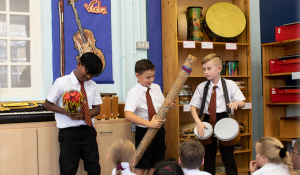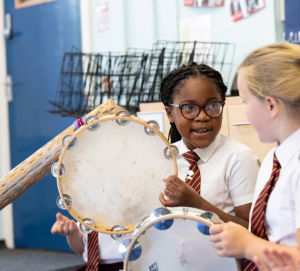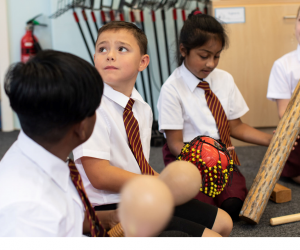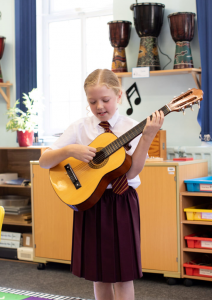 At Harrow Lodge Primary School we highly value music as a vehicle for personal expression and understand that it can play a vital part in the personal development of young people. Music is a unique way of communicating that can inspire and motivate children. Music reflects the culture and society we live in and so the teaching and learning of music enables children to better understand the world they live in. Music also plays an important part in helping our children feel valued as part of a community. Besides being a creative and enjoyable activity, music can also be a highly academic and demanding subject and also an additional medium through which our children can improve their speech and language and reading fluency. Our rich curriculum provides opportunities for all children to create, play, perform and enjoy music, to develop their skills, to appreciate a wide variety of musical forms, and to begin to make judgements about the quality of music.
At Harrow Lodge Primary School we highly value music as a vehicle for personal expression and understand that it can play a vital part in the personal development of young people. Music is a unique way of communicating that can inspire and motivate children. Music reflects the culture and society we live in and so the teaching and learning of music enables children to better understand the world they live in. Music also plays an important part in helping our children feel valued as part of a community. Besides being a creative and enjoyable activity, music can also be a highly academic and demanding subject and also an additional medium through which our children can improve their speech and language and reading fluency. Our rich curriculum provides opportunities for all children to create, play, perform and enjoy music, to develop their skills, to appreciate a wide variety of musical forms, and to begin to make judgements about the quality of music.
The objectives of teaching music in our school are to enable children to:
- know how music is composed and written down
- know how music is influenced by the time, place and purpose for which it was written
- develop the interrelated skills of performing, composing and appreciating music
- develop an awareness of the music of well-known composers (see appendix for how set pieces are allocated to topics in each year group)
- develop an appreciation for music as a means of worship
- develop the skill of collaboration and the ability to listen to others when performing as part of a group
 We aim to make music an enjoyable learning experience. We encourage children to participate in a variety of musical experiences through which we aim to build up the confidence of all children of all abilities and backgrounds. Singing lies at the heart of good music teaching. Our teaching focuses on developing children’s ability to sing in tune and with other people. Through singing songs, children learn about the structure and organisation of music. We teach them to listen to and appreciate different forms of music as they move through the school. As children get older, we expect them to maintain their concentration for longer, and to listen to more extended pieces of music. Children develop descriptive skills in music lessons when learning about how music can represent feelings and emotions. We teach them the disciplined skills of recognising pulse, rhythm, pitch, dynamics, texture and timbre. We often teach these together. We also teach children to make music together, to understand musical notation and to compose pieces.
We aim to make music an enjoyable learning experience. We encourage children to participate in a variety of musical experiences through which we aim to build up the confidence of all children of all abilities and backgrounds. Singing lies at the heart of good music teaching. Our teaching focuses on developing children’s ability to sing in tune and with other people. Through singing songs, children learn about the structure and organisation of music. We teach them to listen to and appreciate different forms of music as they move through the school. As children get older, we expect them to maintain their concentration for longer, and to listen to more extended pieces of music. Children develop descriptive skills in music lessons when learning about how music can represent feelings and emotions. We teach them the disciplined skills of recognising pulse, rhythm, pitch, dynamics, texture and timbre. We often teach these together. We also teach children to make music together, to understand musical notation and to compose pieces.
Our school uses Charanga as the basis for its curriculum planning which reflects the standards set out in the National Primary Curriculum  and exposes children to a wide range of musical instruments, genres, traditions and composers. Its structure is based on the following key areas:
and exposes children to a wide range of musical instruments, genres, traditions and composers. Its structure is based on the following key areas:
- Listening and appreciation
- Musical activities including games, singing, playing instruments, improvisation and composition
- Performance
Please click on the link below to find out more about thie Charanga scheme:
https://charanga.com/site/about-charanga/
Music Long Term Plan

